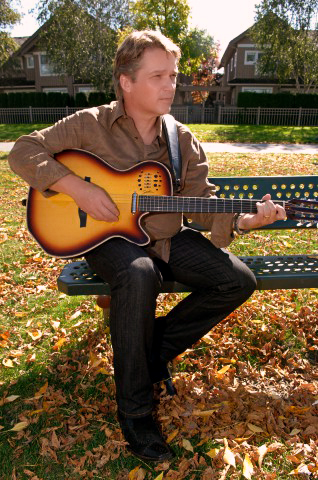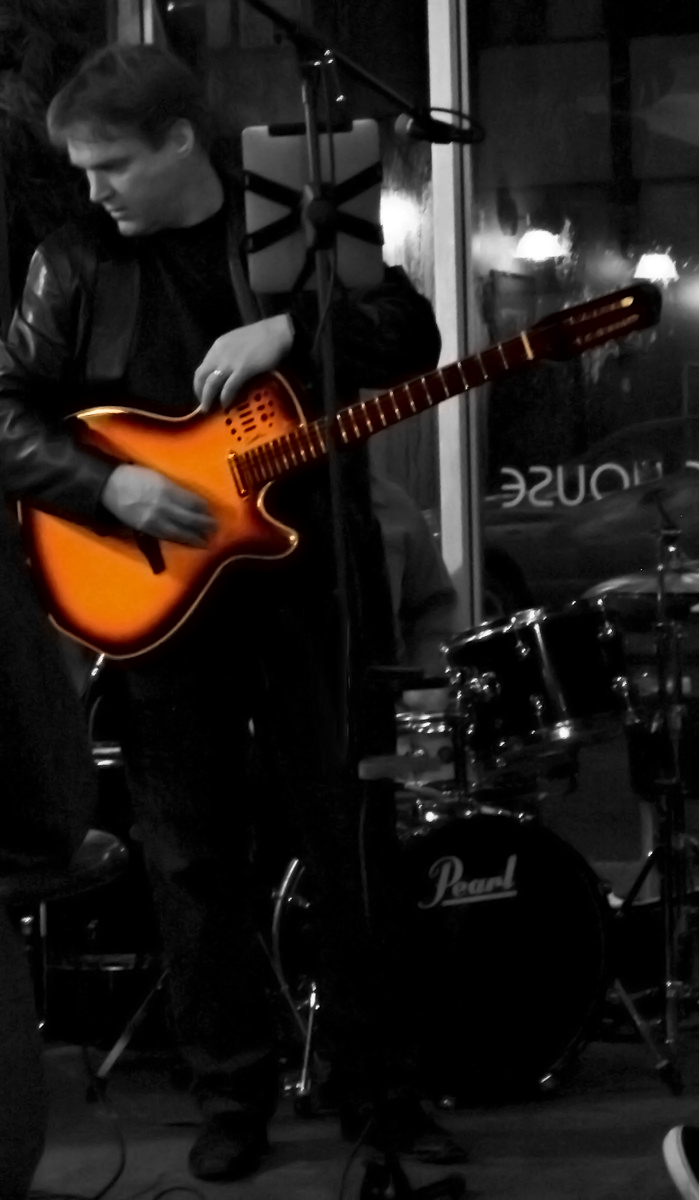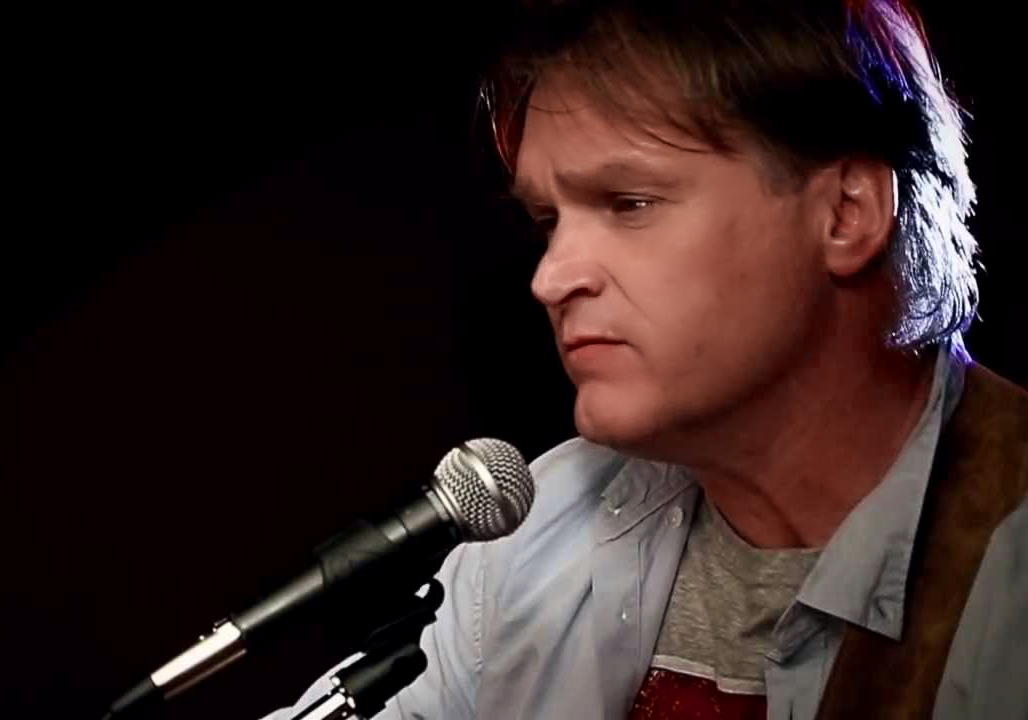Like the great singer-songwriters he admires, guys like Lennon, Dylan and Leonard Cohen, Canadian Rick Parnell inhales the whole world into his heart, and sends it out in his songs. The need to do this drove him from the safety of his past career into his new one, writing songs, making music. Along with living the life of a wandering minstrel and a devoted family man—his son plays lead guitar in the band—Parnell is a deeply insightful writer, able to articulate profound notions in the tight, challenging format of the popular song, as is evident in ‘Next Time Around,” with its enchantingly strange lyrics and subtle video interpretation. Our interviewer Lauren Thompson draws out Parnell on the story behind this song, his life on the musical road, and what comes next for this talented artist from the north country.
LAUREN: When did you first get that feeling that your music career was gaining momentum?
RICK: The very first time I played for a live audience, I felt a phenomenal connection that led me to believe the potential was there.
Another indicator was the positive critical response to my first release, an EP titled ‘One Eye Open’. Some of the feedback to that very straightforward EP came from such unexpected sources, like music listeners and critics from Berlin and various spots in Texas (can you imagine two more disparate sources?). That encouraged me to continue.
I’m continually working to maintain or gain momentum by setting goals for myself as a singer-songwriter, and for my career. When I meet a goal, I set a new one. Goals that aren’t reached inform changes I need to make, either in my approach, or my perspective and my expectations.
LAUREN: Your song 'Next Time Around' is receiving a positive listener response on radio. What was your initial reaction when you first heard your song playing on radio?
RICK: The fantasy of turning on the radio in the car and hearing my voice broadcasting over the airwaves is one I shared with every other singer-songwriter! That and having friends and family tell me they heard me on the radio. While that’s happened several times following interviews and live performances on a local college radio station, most of my radio plays have been outside our home market, so the experience for me feels a little less real or immediate.
I need to actively seek the radio programs playing my songs and stream through the Internet. I'm not lamenting that - it’s just part of the new reality. Growing up in a small town on the outer fringe of urban radio, most of the music that impacted me from recordings was shared through friends, usually late in the evenings in small rooms or basements. Music appreciation was a shared experience and the depth of connection relied on lyrical content as much as musicality. What excites me now is that people who are thousands of miles away, in other countries and continents, are listening to our songs, appreciating them and responding. I love getting feedback and I respond to listeners whenever they reach out.
LAUREN: What was the inspiration behind your debut radio single?
RICK: ‘Next Time Around’ began from an experience I’ve felt - more than once - in which a glance in a mirror reflected someone who didn’t look like the image I had of "me" in my head. The song takes that feeling as its anchor, and weaves a story around it. The lyrics are also informed by my reading of eastern philosophy and mythology, and thinking about how the notion of reincarnation might be affected by a blending of eastern and western society. The impact of the song comes through the realization that everyone goes through a crisis of identity, and that we all feel uncomfortable in our own skin at some point or another. Though much of our experience is shaped by our physical reality - and our bodies are the first aspects of ourselves that others see - we are not our bodies. The video made for this song captures and reinforces this core concept, that gives the song its strength and appeal. Kudos to director Emily Aspland!
LAUREN: It is often said that great art arises from difficult experience. Is there something in your life experience thus far that you would describe as the ‘catalyst’ or ‘fuel’ for your desire to create music?
RICK: My life experience hasn’t been any more difficult than most anyone else’s. Probably the opposite is true! I was shaped by being a middle child in a large family that didn't have a lot of money, and I always saw myself as an outsider. I’m also the classic introvert in an era when extraversion is revered. And I was encouraged to question everything, to distrust authority and to empathize with everyone, but especially with those with little power in our social structure.
LAUREN: How would you characterize yourself as an artist/musician? (Ex. Down-to-earth, serious, fun-loving, complicated…)
RICK: I'd say that I'm grounded. I try not to take myself too seriously, and though I can adopt a serious and even melancholy persona for a song, that’s not who I am. My desire is for the music creation and performance experience to be fun or at least thought-provoking, for myself, my band, and my audience. I like to enjoy the process with my music collaborators, and I love when audience feels good about themselves and about us after a performance. The songs have been called complex and they tend to have an edge, which may suggest rebelliousness or cynicism. But when it comes down to it, as a person, I’m a simple, decent, uncomplicated and optimistic guy.
 |
|
 |
LAUREN: What has your experience been like working with the other people on your team?
RICK: I know my limitations, and they’re considerable. I try to surround myself with people who are much more capable than me. I’m awed by the talent that’s been attracted to perform with me, and that talent has been key to our success. Also, the realities of today's independent music scene make it impossible for most of the members of our team to sustain themselves on music alone, so gigging involves balancing other work and family commitments. Because we all recognize this, we’ve so far been able to avoid the pitfalls and tensions that often accompany band ambitions. The band is always a work-in-progress, and the make-up can vary from gig to gig, depending on who's available, but we've learned to roll with it, with the higher objective of not alienating any of the exceptional talent that has been attracted to participate since the beginning. The songs I've written and my vocals are the constants that define the project.
LAUREN: Did you come from a musical background? Are there other musicians in your family?
RICK: I come from an artistic family. My brother John Parnell is a painter and visual artist and is responsible for the ‘Next Time Around’ album cover as well as the covers from my previous two CDs. Though visual artists are more common in my family, I also have an uncleRick: I come from an artistic family. My brother John Parnell is a painter and visual artist and is responsible for the ‘Next Time Around’ album cover as well as the covers from my previous two CDs. Though visual artists are more common in my family, I also have an uncle who plays clarinet and was a long-standing leader in his local musician's union. Both of my sons are naturally-talented musically, and the younger, Hart, is a member of the band and is studying classical guitar at university.
Recently, a fellow Canadian singer songwriter and I discovered each other's music on the internet and began corresponding as mutual fans. After some back and forth we discovered that we were actually first cousins, unaware of each other due to dramatic twists in family dynamics around the time of my birth.
My own background follows an unusual path. I pursued degrees in economics, history and business and had a successful corporate career with which I grew increasingly dissatisfied. As I started to hit the ceiling, failing to find challenges that excited me, the artist in me began to emerge. My long-held, deep love of music and song began surfacing and I became inspired to see whether I could make it central to a new chapter in my life.
LAUREN: What do you find most rewarding about being an artist? What do you find most challenging?
RICK: I love the creative process. Feeling that initial spark of a song, and seeing how I can develop it into something fresh that resonates on more than one level, really excites me. The first interactions between a new song and an audience is particularly exhilarating, as are those moments when the band helps establish a song’s final form. I also love the recording process and the fine detailing it involves. I especially enjoy experiencing how a song is shaped by interaction with audiences. That wasn't as possible with the earliest songs, which is why we've been re-recording some of them to reflect their evolution through the band sound.
We love to gig, and what's most challenging these days is finding venues that are willing to not just welcome, but to actively promote original music and local musicians to their clientele. Getting them to create or at least see mutual benefit from linking a venue to an original musical experience often feels tougher than it seems it should be.
LAUREN: Who are your role models in music?
RICK: I remain inspired by guys like Leonard Cohen and Bob Dylan. They continue to write great lyrics, and especially in Dylan's case, to perform in smaller venues regularly. Their fans are cross-generational and committed, and they themselves seem inseparable from their art. I think the same can be said for Tom Waits and even guys like Elvis Costello and Neil Young.
I also derive inspiration from classic rock greats like John Lennon, David Bowie, Johnny Cash, George Harrison, The Band, Jeff Lynn, Tom Petty, The Byrds, Brian Wilson etc...etc.
LAUREN: Describe your best or most memorable performance.
RICK: Luckily I tend to forget the worst ones easily! A fun one that comes to mind was earlier this year at a restaurant near the beach in Vancouver. We were playing two nights in quick succession as replacements for a last minute cancellation. The owner likes music and had created an atmosphere that seems to fit our style. We had just recruited a new drummer, and our styles had clicked so quickly that it was hard to believe we’d just started playing together. The stage was too small to fit four of us, so my son, the lead guitarist, found himself playing from a table in front of the stage, sharing fries and refreshments with his girlfriend between songs. We rocked the place and the audience was with us every step of the way - attentive to the original ballads and connected to the faster songs including some covers of diverse classics. We regularly close with a dramatic version of ‘Not Your Man’ and it felt like all eyes and ears in the room were as one. I didn't want it to be over and couldn't wait to get up in front of an audience again.
Another time, I did a set at a roadhouse west of Montreal. I was travelling without my band, but connected with an old friend and accomplished guitarist, Graham Ronne, who had set up the gig. We were joined on stage by a local drummer of considerable renown and an equally brilliant bass player. There was something in the air, and everything seemed to click in the jam. The audience, seemingly filled with music lovers, soaked up every lyric and song, and if someone had offered to sell me property in that community, I was ready to move. That gig changed the way I saw my musicianship and role, and that connection between musicians and the audience is what I strive for ever since.
LAUREN: What advice would you give to young, aspiring artists out there who are unsure and need guidance?
RICK: The first thing I would say is that if you don't love music and have some ulterior desire to do it then don't. It’s not a career for people without passion. If you do it, say yes to every opportunity that will develop your skills, expand your network and or leverage whatever assets you bring to the table. Take care of yourself first but never disrespect anyone you come in contact with (especially not the sound guy!). Keep a clear head and don't risk either your talent or your career on any single action or compromise.
I'd also tell them to set measurable goals, and to evaluate and reevaluate on a regular basis.
LAUREN: What's next for you as an artist? Is there a new single in the works? If so, what can you tell us about it?
RICK: We’re currently working on a broad collection of original songs, which in the old days would be enough to constitute a double album. Some of them were written before the release of ‘Next Time Around,’ and many of them have already found their way into regular rotation at our live shows. They range from bare bones acoustic numbers to fully fledge band rockers.
If there is a single coming soon it will likely be ‘Until the Dawn,’ a band favourite. The song rocks at a faster tempo than any of our previous work and includes me on harmonica. It's lyrically intriguing, plays with themes of generational discord between fathers and sons in particular, and the cliches that escape our lips in the heat of family turmoil. Other sample masters from the album(s) can already be heard on our site or through links to our various social network pages.
I'm also hoping to mount a tour or two outside of our home province over the next year to promote the new material. Let’s stay in touch!
LAUREN: Alexis: Absolutely! I'm looking forward to the new single. I hope you tear it up on the tour and with your recording plans. Thanks much for taking the time to talk.
http://www.rickparnell.com
© 2024 Marquix Global Network
|


